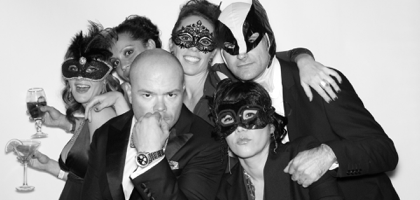
When we sat down and thought about what kind of event we were going to do for the LIPF, there were plenty of ideas to go around. But one in particular stuck, and as we got closer to the 27th, everything just really came together.
I sat restless in my apartment for about 48 hours in advance of the event. My voice recorder was in my hand, and the LIPF video was playing in the background on my big screen. Tears were streaming from eyes, down previous tracks that had dried twenty minutes earlier, as I paced and re-worded the speech I would be giving on the 27th.
The video was set on repeat. Each time I watched a new word, it would rattle my insides and start the emotion anew.
The Masquerade Ball has meaning beyond just a fancy way to raise some money around Halloween. The very root of the event is the foundation and principle of the very word that it is based: mask. In both its noun and verb format, the meaning is very appropriate: an object we use to conceal our true identity, to conceal, to disguise. To disguise one’s true feelings.
When people arrived—and boy, did they arrive—we encouraged everybody to keep their masks on until we had a chance to premiere the video. As I watched the eyes of the people behind the masks while they watched the video, I could see the trigger words slicing though them. You see a glance-away, or a hand come up to the face.
When we finished watching, I looked at many of you and tried to explain how those words and those people are reflective of the challenge we are up against. Every person in that room found a word that caused their tear duct to fill, or their Adam’s apple to shift. But what was consistent may have not been the word you identified with, but that you weren’t thinking about me or David: You were thinking about how YOU sometimes feel this way. I saw how brutally honest this was—these feelings don’t discriminate. As the video shows, anybody and everybody is affected at some point in their life with this.
I asked everybody in the room to drum up that word in their mind. And to think about how the mask that they were wearing right then was concealing that word. I talked about how if we keep the mask on, then those words are concealed longer, and they can metastasize into something more sinister. And then we did something remarkable: I asked everybody to remove their mask and, when they do, to scream out the word that resonated with them and look around at the people with their masks off, exposed, allowing their insecurities and worries to be shared with everybody else.
We removed our masks for only a moment, and the cacophony of words in the air created an indecipherable new sound: a sound of hope—a sound, to me, that made the months of planning and stress worth it. We as a group spoke honestly to one another; we took off our masks if only for a moment and took a little solace knowing we are not the only ones who feel this way. It was going to be okay. It was a baby step in the right direction.
The masks we wear in our daily lives are essential in our coping with the day-to-day. However, we must be cognizant of the dangers that exist when we cannot be honest with ourselves and also find solace in somebody we can share with.
I yelled out “hopeless.” As soon as it left my lungs, “hope” was my next breath… hope that through open conversation, we can begin to overcome.


